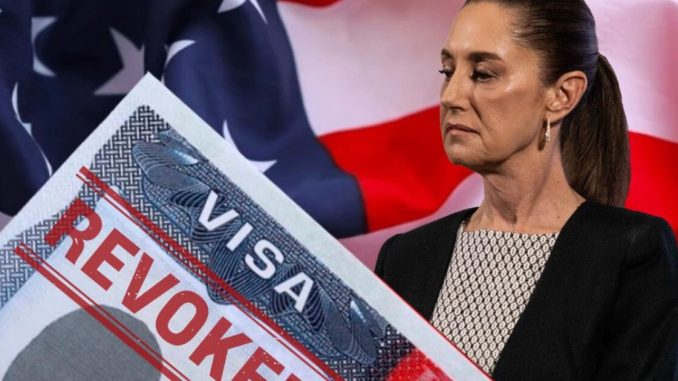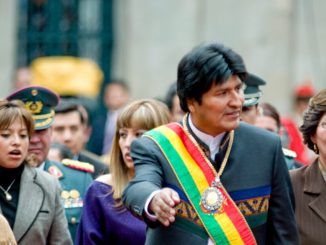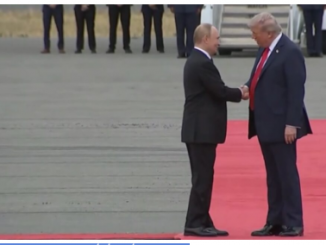
Published October 15, 2025
In a bold and controversial move, President Donald Trump’s administration has reportedly revoked U.S. visas of about 50 Mexican officials suspected of having ties to powerful drug cartels. The decision marks one of the toughest diplomatic actions in recent years, sending shockwaves through Mexico’s political establishment and reigniting debate over cross-border corruption and U.S.–Mexico relations.
Crackdown on Corruption
According to multiple reports, including Gateway Hispanic and Inkl News, the visa revocations target officials from several political parties, though a majority are said to belong to Morena, the ruling party of Mexican President Claudia Sheinbaum. The U.S. State Department and the Drug Enforcement Administration (DEA) reportedly based their decision on intelligence linking certain politicians to organized crime networks, particularly the Sinaloa Cartel.
Among those affected, Baja California Governor Marina del Pilar Ávila has confirmed that her visa was revoked. Other names remain undisclosed, but sources claim that both federal and local officials — including senators and party advisers — are under scrutiny.
A New Phase in the War on Drugs
The move signals a new strategy in Washington’s long-standing fight against drug trafficking. Instead of military operations or direct interventions, the Trump administration appears to be using visa power as a diplomatic weapon — denying U.S. entry to officials suspected of cartel collaboration.
Officials familiar with the decision described it as part of a broader “anti-corruption offensive,” aimed at isolating politicians believed to have enabled cartel influence in government institutions. Reports suggest the U.S. acted after Mexican authorities allegedly failed to investigate several high-profile corruption cases connected to the drug trade.
“This is about accountability,” one U.S. source was quoted as saying. “If Mexico won’t act, we will.”
Reaction from Mexico
The Mexican government has called the move unilateral and expressed concern over the lack of transparency in Washington’s decision. President Claudia Sheinbaum confirmed that her administration had received no detailed list or evidence against the officials affected, citing diplomatic confidentiality and intelligence restrictions.
Sheinbaum also warned that Mexico would not tolerate actions that undermine its sovereignty, though she emphasized the importance of continuing cooperation with the U.S. in fighting organized crime.
“This type of decision should be based on solid evidence and mutual respect,” she said during a press briefing. “We will not accept measures that stigmatize our officials without due process.”
Echoes Across Latin America
Visa revocations have been used by past U.S. administrations to target corruption abroad, but analysts note that this case is unprecedented in scale. Similar measures were previously taken against officials in Brazil, Colombia, and Venezuela, though never involving such a large number of active government figures from a key ally.
Observers see this as part of Trump’s “hardline diplomacy” — a foreign policy approach that extends the America First doctrine into Latin America. By cutting off access to the United States, Washington aims to pressure foreign governments to clean up internal corruption while asserting its dominance in regional affairs.
Shifting Dynamics
The decision to revoke visas also highlights the deep interconnection between politics, security, and diplomacy in North America. While Mexico continues to grapple with cartel violence, the U.S. move underscores Washington’s frustration with what it sees as weak enforcement and insufficient action against corruption.
Whether this new approach will lead to greater accountability or further strain relations remains to be seen. For now, it has placed Mexico’s political class under the microscope — and reminded the region that in Washington’s eyes, the fight against the cartels extends far beyond the border.
 Implications
Implications
Here are the implications of President Trump’s reported visa revocations of Mexican officials over suspected cartel ties — summarized clearly and grouped for impact:
1. Diplomatic Fallout
-
🇲🇽 U.S.–Mexico relations could enter a tense phase. Mexico may view this as interference in its internal affairs.
-
This could strain cooperation on migration control, border security, and intelligence sharing, especially if Mexico demands proof or retaliation.
2. Political Shockwaves in Mexico
-
The move directly pressures President Claudia Sheinbaum’s administration, especially since many of those affected are from her ruling Morena Party.
-
It could erode public trust in government institutions if cartel infiltration appears widespread.
-
Rival parties may use the issue to attack Morena and push for anti-corruption reforms.
3. U.S. Strategy and Regional Message
-
The mass visa cancellations signal a new phase in Trump’s anti-cartel policy — less military intervention, more political and economic isolation.
-
It sends a warning to other Latin American officials that U.S. visas are privileges that can be revoked for suspected corruption or criminal ties.
-
The move reinforces Trump’s image of hardline diplomacy: using immigration and visa control as leverage in foreign policy.
4. Legal and Ethical Questions
-
Without public evidence, the action could raise questions about due process and transparency.
-
Critics may accuse Washington of acting on unverified intelligence or political motives.
-
Those affected could challenge the revocations in international courts or the U.S. legal system.
5. Security & Anti-Corruption Impact
-
If allegations hold, this could disrupt cartel–government networks and reduce cross-border protection for traffickers.
-
It could also motivate Mexican prosecutors to act against implicated officials, fearing U.S. pressure or sanctions.
-
However, if not followed by arrests or legal cases, the move may appear symbolic rather than substantive.
6. Global and Economic Repercussions
-
Investors may see this as a sign of political instability in Mexico, affecting trade and tourism.
-
The U.S. could leverage similar tactics elsewhere — targeting elites in nations with drug, terror, or corruption ties.
-
The episode strengthens Washington’s precedent for using visa power as a geopolitical tool.
 Overall Takeaway:
Overall Takeaway:
The U.S. decision to revoke visas from dozens of Mexican officials suspected of cartel connections marks a bold escalation in Washington’s fight against organized crime. Rather than relying solely on military or border operations, the Trump administration has chosen a diplomatic weapon — targeting privilege, status, and access to American soil.
For Mexico, the move is a diplomatic jolt that exposes deep concerns about cartel infiltration in politics, challenging the Sheinbaum government to prove its commitment to transparency and accountability. For the United States, it signals a readiness to act unilaterally when it believes its southern neighbor isn’t doing enough to curb corruption and narco-influence.
Whether this strategy brings genuine reform or fuels resentment will depend on what follows — concrete prosecutions or mere political posturing. What is certain is that this episode redefines the contours of U.S.–Mexico relations, turning visa policy into a new frontline in the global war on drugs and corruption.
SOURCES: THE GATEWAY HISPANIC – President Trump Hits Cartels Hard, Revokes Visas of 50 Mexican Politicians and Government Officials
INKL – Trump Admin Reportedly Revokes Visas Of Dozens Of Mexican Officials Over Suspected Cartel Ties





Be the first to comment